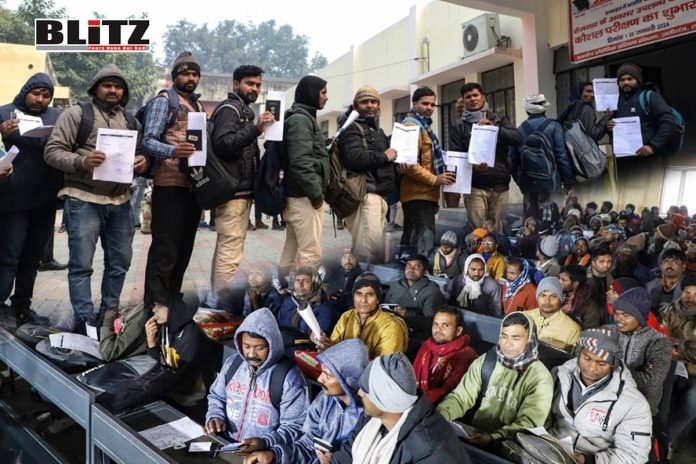In the throes of geopolitical turbulence and economic adversity, a burgeoning exodus of Indian laborers is unfolding, driven by a fervent pursuit of escape from debt and a yearning for improved livelihoods abroad. Against the backdrop of India’s fluctuating unemployment rates and a job market mired in uncertainty, the allure of employment prospects in Israel’s construction sector has emerged as a beacon of hope for countless individuals. Embarking on this journey entails confronting multifaceted challenges and uncertainties, yet for individuals like Aman Kumar and Milan Maurya, the promise of a brighter future outweighs the risks posed by conflict and instability.
Aman Kumar, a 27-year-old structural fitter hailing from India’s agrarian heartland in Haryana, embodies the struggles and aspirations of many young Indians ensnared in cycles of poverty and indebtedness. Despite possessing skills and qualifications, Aman finds himself ensnared in a precarious financial quagmire, grappling with a meager monthly income devoid of job security or social protections. Faced with limited opportunities for advancement in his homeland and burdened by mounting debts, Aman views the prospect of employment in Israel’s construction industry as a lifeline-a chance to break free from the constraints of financial destitution and secure a better future for himself and his family.
Similarly, Milan Maurya, a 34-year-old steel bender from Uttar Pradesh, finds himself navigating a labyrinth of economic challenges and familial responsibilities. Having previously sought employment in Malaysia prior to the onset of the COVID-19 pandemic, Milan now confronts the harsh reality of a stagnant job market and dwindling prospects in his native land. Faced with mounting debts and the pressing need to provide for his family, Milan sees Israel as a beacon of hope-a land where he can earn a livelihood commensurate with his skills and aspirations, thereby alleviating the financial burdens weighing heavily upon him.
The recruitment drive initiated by Israel’s construction sector has elicited significant interest and participation from aspiring Indian laborers across the country. In December, recruiters targeted states like Haryana and Uttar Pradesh, distributing thousands of applications facilitated by state governments. The rigorous selection process, involving tests, paperwork, and health examinations, underscores the gravity of the decision confronting these laborers-a decision fraught with uncertainty and complexity yet imbued with the promise of economic empowerment and opportunity.
However, the allure of higher wages and a brighter future abroad is juxtaposed against the backdrop of looming geopolitical tensions and security concerns. The ongoing conflict between Israel and Hamas casts a shadow of uncertainty over the prospects of Indian laborers seeking employment in the region, prompting apprehensions among prospective migrants and their families. The recent advisory issued by the Indian government, urging nationals residing in Israel’s border areas to relocate to safer regions, serves as a stark reminder of the risks inherent in pursuing opportunities abroad amidst volatile geopolitical dynamics.
Navigating familial opposition adds another layer of complexity to the decision-making process for individuals like Aman and Milan, who must contend with the anxieties and concerns of their loved ones. Despite their efforts to assuage fears and provide reassurance, the specter of danger looms large, underscoring the profound emotional and psychological toll exacted by the prospect of venturing into unfamiliar territory in pursuit of economic security and opportunity.
Moreover, the phenomenon of Indian laborers seeking employment opportunities abroad underscores broader systemic issues plaguing India’s economy, including pervasive unemployment and underemployment. While government officials tout declining unemployment rates as a sign of progress, critics argue that these figures belie the underlying structural challenges confronting the country’s labor force. Swami Prasad Maurya, an opposition politician, lambasts the government’s failure to address the root causes of unemployment and calls for urgent action to stem the tide of emigration.
In response to these criticisms, government officials emphasize the myriad job opportunities available within India and seek to downplay concerns regarding deployment to conflict zones. Rakesh Tripathi, spokesperson for the ruling Bharatiya Janata Party (BJP) in Uttar Pradesh, underscores the government’s commitment to job creation and asserts that the opportunity in Israel represents just one of many options available to Indian workers.
As the steady stream of laborers seeking employment in Israel’s construction sector persists unabated, it serves as a poignant reminder of the intricate interplay between economic desperation, geopolitical volatility, and the unwavering human pursuit of a more promising existence. Within this narrative, the stories of individuals such as Aman Kumar and Milan Maurya stand as emblematic examples, showcasing not just a mere leap of faith, but a profound testament to the enduring resilience and tenacity of the human spirit when confronted with formidable challenges.




